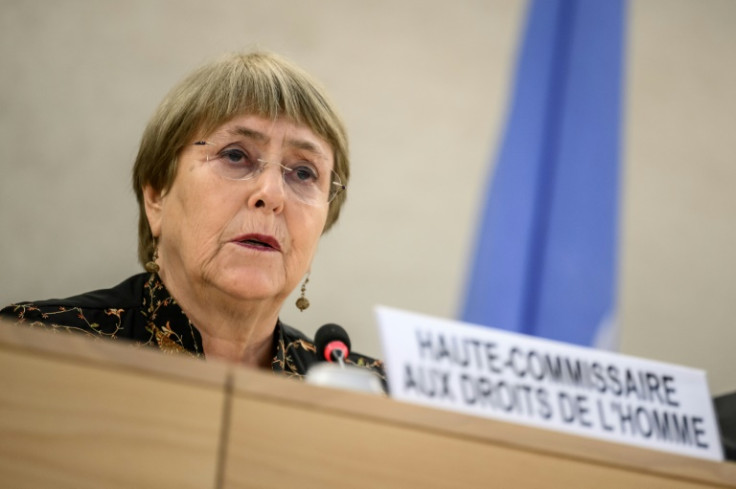UN Rights Chief Bachelet Won't Seek Second Term

UN rights chief Michelle Bachelet said Monday she will not seek a second term, ending months of speculation amid growing criticism of her lax stance on rights abuses in China.
"As my term as High Commissioner draws to a close, this Council's milestone 50th session will be the last which I brief," Bachelet told the UN Human Rights Council as it opened a four-week sitting.
She provided no explanation for her decision.
The 70-year-old former Chilean president, who will wrap up her four-year mandate at the end of August, had until now remained mum about whether she would seek to stay on for a second term.
Speculation has been rife for months, with a wide range of diplomats in Geneva telling AFP in recent weeks that she had yet to provide clues to her plans.
The post of High Commissioner for Human Rights typically faces heavy political pressure from countries around the world, and while it can be held for a maximum of two terms, nearly all of Bachelet's predecessors have avoided staying on for more than one term.
Bachelet has faced mounting criticism from countries and NGOs for not speaking out more forcefully against allegations of widespread rights abuses in some countries, most notably in China.
When she was appointed in 2018 by UN Secretary-General Antonio Guterres, it was clear she was meant to mark a break with the repeated declarations of outrage by her very outspoken predecessor Zeid Ra'ad Al Hussein of Jordan.
Bachelet, who went from torture victim under Augusto Pinochet to become the first woman to serve as president of Chile, has instead emphasised the importance of dialogue and discrete diplomacy in forwarding rights in various countries.
This approach has not sat well with some and she has faced significant pushback over her restraint, especially when it comes to China.
She did take a long-awaited trip to the country last month -- the first in 17 years by a UN rights chief.
The trip took her to the far-western Xinjiang region, where China is alleged to have detained over a million Uyghurs and other Muslim minorities, as well as carried out forced sterilisation of women and coerced labour.
The United States has labelled China's actions in Xinjiang a "genocide" and "crimes against humanity", allegations vehemently denied by Beijing which says its security crackdown in the region was a necessary response to extremism.
While there, Bachelet did raise concerns about the situation, but NGOs said had not gone far enough and had "legitimised Beijing's attempt to cover up its crimes".
In her statement to the Rights Council Monday, Bachelet stressed that she had "raised concerns regarding the human rights situation of the Uyghur and other predominantly Muslim minorities in Xinjiang, including broad arbitrary detention and patterns of abuse."
Bachelet, who has faced harsh criticism for so far failing to release a report on the rights situation in Xinjiang, said the report was now "being updated".
"It will be shared with the government for factual comments before publication," she said.
At the same time, she hailed the opening of dialogue with China, saying there was now an agreement to "hold an annual senior meeting on human rights and to continue exchanges on "specific human rights issues of concern".
"We are now elaborating concrete steps to put the agreements into action."
Presenting an overview of a long line of rights situations of concern around the world, Bachelet appealed Monday to the rights council to "continue to seek dialogue".
"Be willing to hear the other, to understand respective points of view and to actively work towards identifying common ground," she said.
© Copyright AFP 2025. All rights reserved.





















